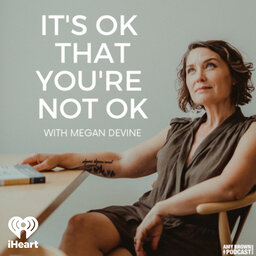Is There Any Good News on Climate Change? with Bill McKibben
It’s OK That You’re Not OK with Megan Devine
Life is full of difficult things, from tiny everyday disappointments to life-altering events. Everyone’s at least a little bit Not OK, something grief…We’re in a massive climate crisis, but it’s hard to think about it, isn’t it?
It’s a great temptation to shut our eyes to climate change. It’s overwhelming. This week on the show, climate activist and author Bill McKibben on facing the reality of the climate crisis, understanding what needs to change, and what you can do - not just to change the course of humanity and the planet, but to feel more hopeful and connected as this all unfolds.
In this episode we cover:
- Is halting climate change really dependent on personal recycling and whether we use plastic straws?
- Is it okay to have intense emotional responses to wildfires, floods, and the inaction of those “in charge”?
- How the boomer generation is using their experience and wealth to revisit the activism of their youth (and supporting younger activists at the same time)
- How talking about our fears and our ecological grief gives us common ground to fight for our future - and our present.
We're re-releasing some of our favorite episodes from the first 3 seasons. This episode was originally recorded in 2023.
Looking for a creative exploration of grief? Check out the best selling Writing Your Grief course here.
For more on activism in the face of impossible odds listen to these related episodes:
Women, Life, Freedom: Grief and Power In Iran, with Nazanin Nour
Wonder in an Age of Violence with Valarie Kaur & See No Stranger
About our guest:
Bill McKibben is an American environmentalist, author, and journalist who has written extensively on the impact of global warming. His books include The End of Nature, about climate change, and Falter: Has the Human Game Begun to Play Itself Out?, about the state of the environmental challenges facing humanity.
Bill is a contributing writer to The New Yorker (read his latest piece here), and founder of Third Act, which organizes people over the age of sixty for progressive change.
About Megan:
Psychotherapist Megan Devine is one of today’s leading experts on grief, from life-altering losses to the everyday grief that we don’t call grief. Get the best-selling book on grief in over a decade, It’s Ok that You’re Not OK, wherever you get books. Find Megan @refugeingrief
Additional Resources:
Terry Tempest Williams’ book Refuge: An Unnatural History of Family and Place, and her recent NYT article on Utah’s great Salt Lake (gift link, no subscription needed)
Explore Joanna Macy’s work on the intersection of grief and activism at her website, or her books, including Coming Back to Life: The Updated Guide to the Work That Reconnects, World as Lover, World as Self, and Widening Circles: A Memoir
Want to talk with Megan directly? Join our patreon community for live monthly Q&A grief clinics: your questions, answered. Want to speak to her privately? Apply for a 1:1 grief consultation here.
Check out Megan’s best-selling books - It’s OK That You're Not OK and How to Carry What Can’t Be Fixed
Books and resources may contain affiliate links.
Follow our show on Instagram, Facebook, Twitter, and TikTok @refugeingrief
For more information, including clinical training and consulting and to share your thoughts, visit us at refugeingrief.com
In 1 playlist(s)
It’s OK That You’re Not OK with Megan Devine
Life is full of difficult things, from tiny everyday disappointments to life-altering events. Everyo…Social links
Follow podcast
Recent clips

Protecting Your Mental Health in the Healthcare Workplace, with the Burned Out Burnout Expert, Dr. Jessi Gold
37:29

Over and Over Again: Illustrator Aubrey Hirsch on the Power of Storytelling
39:19

Untangled: Suffering & The 8-Fold Path with Koshin Paley Ellison
1:02:51
 It’s OK That You’re Not OK with Megan Devine
It’s OK That You’re Not OK with Megan Devine